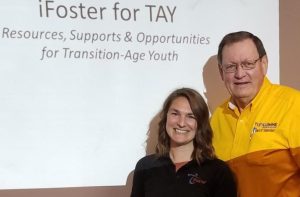Sonora, CA – Nearly two dozen foster youth are receiving a valuable tool that researchers say can help boost their academic performance, social connectedness, and life satisfaction as they prepare to step out on their own.
The recent gifting of laptop computers is part of a multi-agency effort in partnership with the Truckee-based national nonprofit iFoster. Heading up the distribution to 23 of Tuolumne County’s foster youth and former foster youth ages 16-21 was District 2 Supervisor Randy Hanvelt, who is also the current First Vice Chair on the Rural County Representatives of California (RCRC) Executive Board, and Kristine Schneller, a business development specialist at iFoster.
Last year, the boards of RCRC and National Homebuyers Fund both approved providing $200,000 to support the “1 Laptop Program for Foster Youth” run through iFoster. The one-time donation is benefitting eligible candidates within California’s 35 RCRC counties; specifically by providing them with personal laptops outfitted with the iFoster-developed Transitional Age Youth (TAY) Assistant, which includes a secure online digital locker that is always accessible.
iFoster’s work is focused on helping ensure that every child growing up outside of their biological home has the resources and opportunities they need to become successful, independent adults. It turns out and certainly makes sense that owning a computer helps foster youth as they move through placements personally address challenges such as accessing needed resources and preventing the loss or misplacement of important life documents.
Connecting Foster Youth With Resources, Outlets
A 2016 study that tracked youth across California who received iFoster computers found that only five percent of rural foster youth have consistent access to a computer in their homes, compared to earlier Pew Research Center research, which indicated 90 percent of all teens and 79 percent of low-income teens had that. Further findings showed that when provided with a computer, 98 percent of youth reported using it daily or weekly and as a result did better at school and were also more socially connected and satisfied with their life.
Hanvelt is proud to recount RCRC’s philanthropic activities, which range from helping provide transitional housing for vets and aid for wildfire survivors to educational outreach increasing awareness and ways to recognize and report signs of sex and human labor trafficking. He confides that after hearing iFoster’s presentation at the RCRC board’s last annual meeting, he pushed support for the laptop funding project.
With obvious enthusiasm, he says, “Now RCRC is giving a laptop to every single foster kid in the rural counties that is in the age group that qualifies for near-emancipation…to help them survive — and thrive.” He further shares, “I am very thrilled to be a part of it — and it was fun to be a part of being part of the giveaway of the first ones in Tuolumne County.”


